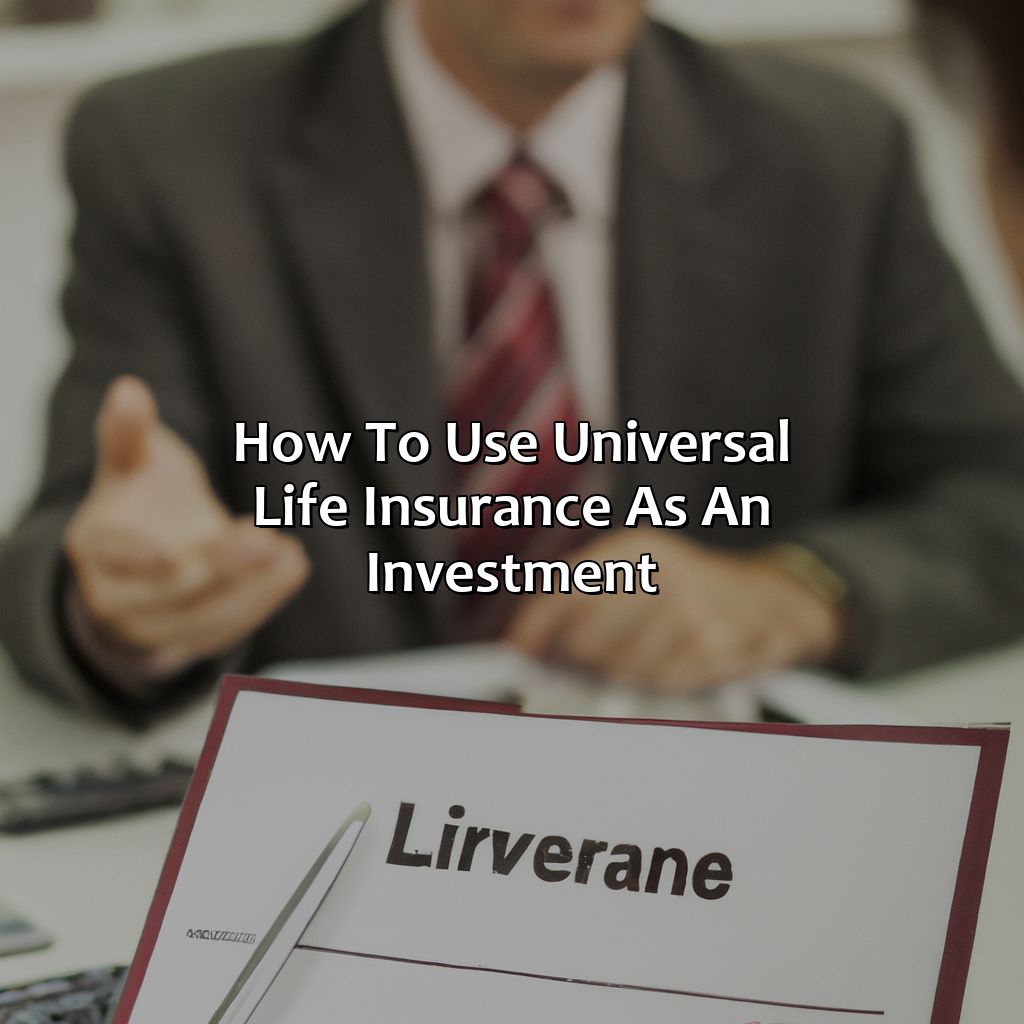How To Use Universal Life Insurance As An Investment?
Key Takeaway:
- Universal life insurance is a type of insurance that also serves as an investment vehicle, allowing policyholders to accumulate cash value over time.
- One of the benefits of using universal life insurance as an investment is the tax-deferred cash value growth, which can be accessed later in life without incurring tax penalties.
- To maximize the investment potential of universal life insurance, it is important to choose the right policy, regularly fund and monitor the policy, and consider the tax implications of withdrawals and transfers.
Are you looking for a reliable way to invest and get financial security? Universal life insurance provides an excellent option to do just that. Discover how you can diversify and grow your portfolio with this valuable tool.
What is Universal Life Insurance?
To grasp Universal Life Insurance, its definition, and how to invest with it, learn its features and types. This section will explore why Universal Life Insurance is so appealing. The subsections will break down its features and types clearly.
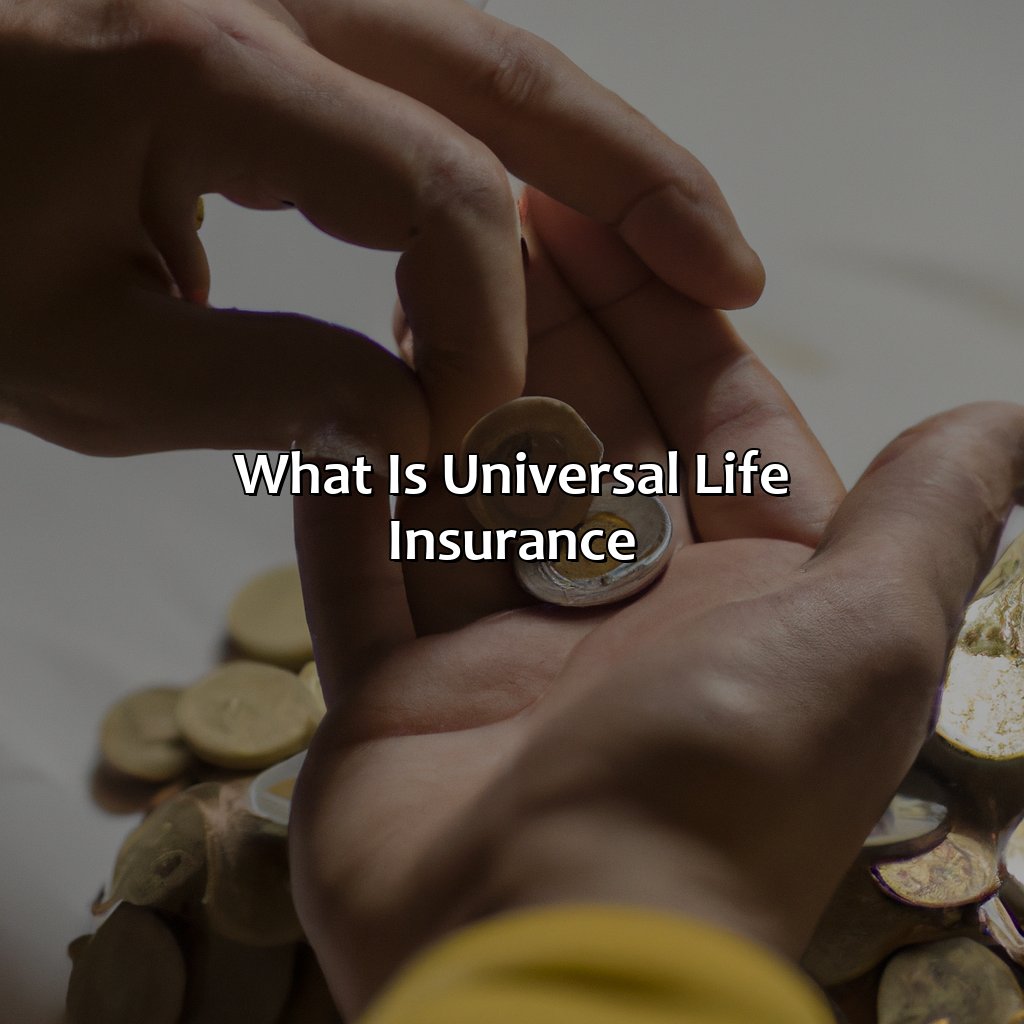
Image credits: retiregenz.com by David Arnold
Definition and Features
Universal Life Insurance Explained: A Comprehensive Guide
Universal life insurance is a type of insurance that is designed to offer unparalleled flexibility and versatility in terms of policy features, cash value accumulation, and death benefit coverage. Unlike traditional term life insurance or whole life insurance policies that have fixed premiums, universal life insurance allows policyholders to adjust their coverage and premiums as necessary based on their financial circumstances at different stages of their lives. This type of insurance typically offers a death benefit, savings component, and investment options that can allow you to grow your wealth and provide financial security for yourself or your loved ones.
With universal life insurance, you have the option to withdraw or borrow from the accumulated cash value without penalties or taxes. Some policies also offer riders that provide additional protection for you or your beneficiaries in certain situations such as disability or chronic illness.
One unique feature of universal life insurance is its ability to function as an investment vehicle. Policyholders are often able to choose between various investment options such as stocks, bonds, and mutual funds, allowing them to leverage the potential growth of their investments while still enjoying the security offered by a life insurance policy.
A true story illustrating the benefits of universal life insurance comes from a family devastated by the unexpected loss of their primary income earner. Thanks to their existing universal life policy with accumulated cash values that had grown over time through market investments, they were able to access tax-free funds that allowed them to pay off their debt and maintain their lifestyle until they could get back on track financially. Universal life insurance indeed plays an important role in securing one’s financial future providing flexibility, growth, and security all rolled into one comprehensive package.
When it comes to Universal Life Insurance, there are more types than there are sins to confess in a Catholic church.
Types of Universal Life Insurance
Universal Life Insurance is a versatile financial tool that offers lifelong coverage by combining the protective features of traditional life insurance with an investment account’s growth potential. There are diverse options within Universal Life Insurance, and policyholders must choose the right one to match their needs.
For better understanding, here is a table outlining the available types of Universal Life Insurance and their characteristics:
| Type | Characteristics |
|---|---|
| Traditional UL | Fixed premiums and adjustable death benefit; cash value account grows at a declared interest rate |
| Indexed UL | Flexible premiums and adjustable death benefit; cash value linked to an equity index’s performance |
| Variable UL | Flexible premiums and death benefit; cash value invested in mutual funds, separate accounts, or exchange-traded funds (ETFs) for higher returns but accompanied by greater risk |
Each type of Universal Life Insurance comes with its unique advantages and disadvantages. Therefore, choosing the right plan requires detailed knowledge of how each works.
It is worth noting that while traditional UL may be more predictable, with guaranteed minimum interest rates on its cash value component, indexed UL benefits from greater upside potential through the associated equity market.
To make the most out of any universal life insurance policy financially, individuals need to understand their life goals’ long-term financial implications. It’s also essential to balance risk with reward when deciding which plan to opt for.
To maximize your investment returns under variable universal life insurance, it’s advisable to diversify your investment portfolio and keep an eye on your fund fees. However, universal life insurance isn’t appropriate for everyone as it can have complicated features that may require expert guidance before purchasing.
Universal life insurance: the perfect way to invest in your future and ensure your loved ones have a secure financial future, but only if you don’t mind death being the ultimate payday.
Using Universal Life Insurance as an Investment
Universal Life Insurance can be used as an investment tool. Focus on building cash value for extra income in tough times. Advantages of this strategy are improved estate and tax planning, plus extra flexibility. However, Risks and Considerations must be taken into account. To make the most of your investment, make sure to review them carefully.
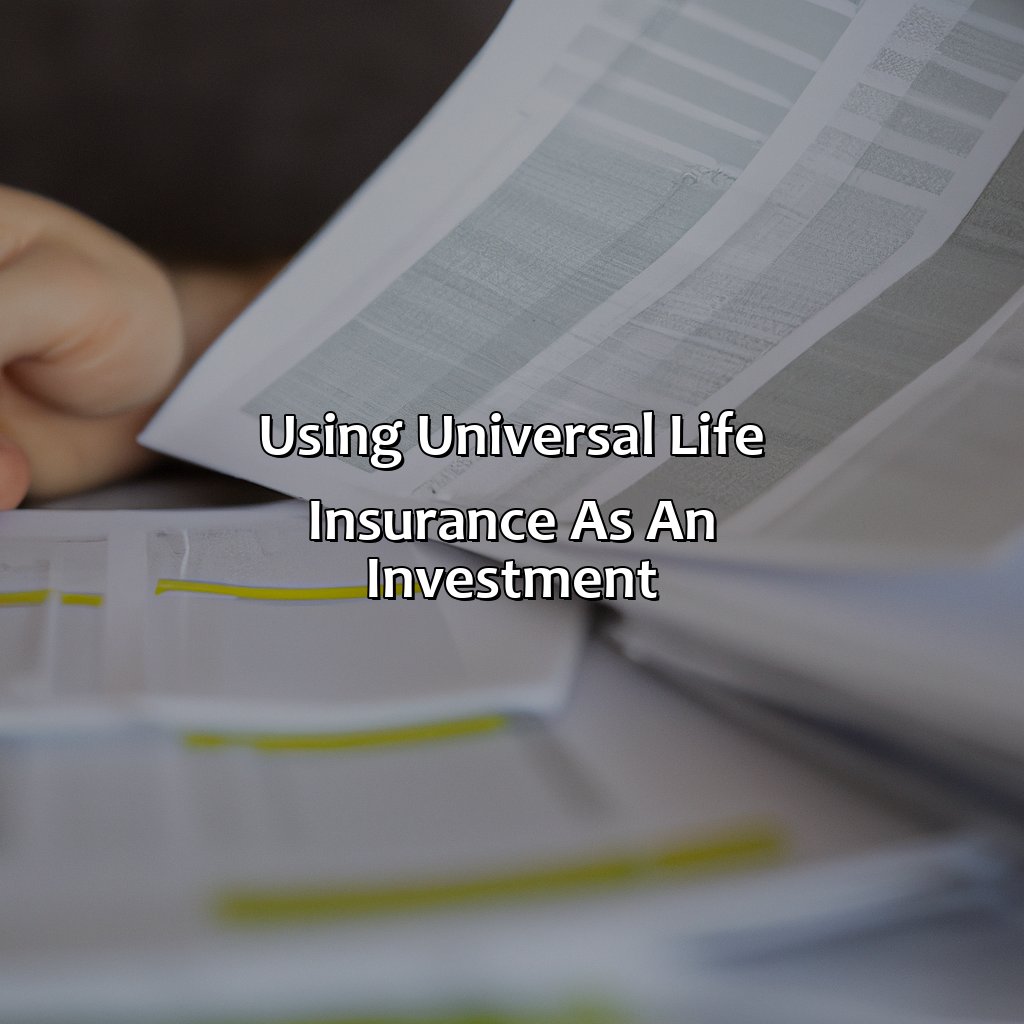
Image credits: retiregenz.com by Harry Jones
Cash Value Accumulation
One of the key features of Universal Life Insurance is the accumulation of cash value. This refers to the amount of money that builds up within the policy based on a portion of each premium payment. The cash value can be used as an investment tool or even to pay premiums later in life.
The growth potential of the cash value depends on the interest rates set by the insurance company, as well as any investment choices made by the policyholder. It can be accessed through loans, withdrawals, or even surrendering the policy. However, any withdrawals or loans may impact the death benefit and could result in tax consequences.
It’s important to note that while cash value accumulation is a valuable aspect of Universal Life Insurance, it should not be solely relied upon as an investment strategy. It’s recommended that individuals consult with a financial advisor to determine if this type of policy aligns with their overall financial goals.
In some cases, investors have misused Universal Life Insurance policies as an investment tool, leading to negative consequences such as lapsed policies due to insufficient premium payments or unexpected tax implications. As with any investment decision, careful consideration and planning are crucial for maximizing benefits and avoiding potential risks.
Universal life insurance as an investment: it’s like killing two birds with one premium payment.
Benefits of Using Universal Life Insurance as an Investment
If you’re exploring investment options, Universal Life Insurance (ULI) might be worth considering. ULI offers unique benefits that traditional investment methods don’t provide. Here are 6 reasons why ULI can act as an excellent investment option:
- Flexible Payments: You can choose the frequency and amount of premium payments.
- Tax Benefits: The death benefit paid out to beneficiaries is tax-free while the cash value grows tax-free.
- Market Exposure: Policyholders can invest in a range of funds from relatively safe fixed-income investments to higher-risk equities.
- Savings Element: Part of each premium goes towards building up your policy’s cash value, which earns interest.
- Estate Planning: ULI policies enable users to manage their estate plans that other financial products might not offer.
- Protection against Unforeseen Circumstances: ULI offers coverage options that give policyholders additional protection if unexpected events occur in their lives.
It’s important to note that each case is different, and everyone should consider their specific financial goals before committing to any investment plan. Still, ULIs provide flexibility, tax advantages and potential long-term gains that could make them worthwhile.
If you are looking for a method that offers several advantages ranging from legacy planning to wealth creation, specialists suggest seriously considering this type of insurance policy if you’re on the hunt for an investment strategy with more flexibility than usual models or less restrictive policies.
Don’t miss out on what could be a wise investment decision. Consider talking with an expert today and see if ULI is right for you.
Using universal life insurance as an investment may be risky, but at least you’ll have something to show for it – besides just a sense of impending doom.
Risks and Considerations
While using universal life insurance as an investment, investors need to consider multiple risks and factors. One should be aware of high premiums, slow growth, hidden fees, and the possibility of reducing death benefits.
Moreover, fluctuations in interest rates can severely affect investment returns. Investors should also stay cautious while dealing with unreliable agents who push their products for personal income incentives.
It is vital to conduct thorough research, seek professional advice and consult with an attorney before investing in a policy.
Along with these considerations, it is essential to note that unexpected circumstances such as regulatory changes or accidents can impact the policy’s future value.
A wise investor once shared how he lost money by investing in a universal life insurance policy without fully understanding its features and risks without proper analysis beforehand. Eventually, he had to surrender it at a loss due to unforeseen complications.
Maximizing your investment potential with universal life insurance is like having your cake and eating it too, just don’t forget to share with your beneficiaries.
How to Maximize the Investment Potential of Universal Life Insurance
Maximizing the investment potential of universal life insurance requires the right policy choice. Plus, effective funding and monitoring. Adjusting the portfolio as needed is key. This section provides the tools to properly use universal life insurance as an investment.
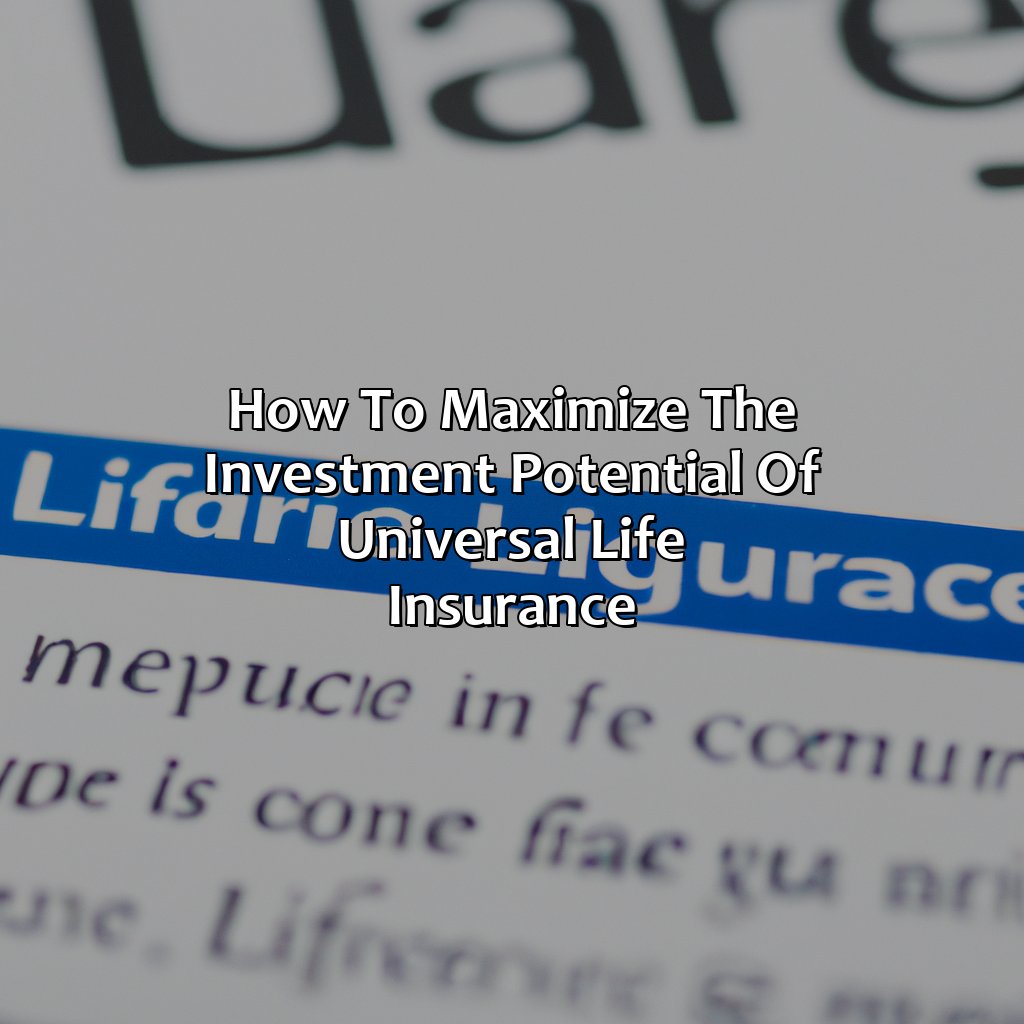
Image credits: retiregenz.com by Yuval Jones
Choosing the Right Policy
The process of selecting the optimal universal life insurance policy can be daunting. Ensure that your chosen policy meets your investment objectives and aligns with your risk tolerance level. Analyze various options available in the market and compare costs and benefits to make an informed decision.
When choosing a universal life insurance policy, it is essential to take into account the cash-value accumulation feature, premium flexibility, death benefit guarantee, and rider options such as long-term care provisions or disability waivers. Additionally, you should consider the duration of coverage needed as policies have different maturity dates.
Furthermore, ensure that you commission a trusted financial advisor who will provide unbiased advice on selecting the best-suited policy for your needs.
It is worth remembering that anyone can rally an article full of opinions on universal life insurance investment potential; that being said, it’s best if you study concrete data from credible sources before making any decisions. According to Investopedia, “Universal Life Insurance is a type of permanent life insurance with an adjustable interest rate tied to either money markets or other financial benchmarks.”
Fund your policy like it’s your retirement plan because, well, it is.
Funding the Policy
Investment Potential of Universal Life Insurance is maximized by funding the policy regularly. This guarantees steady growth in cash value, which can serve as an investment vehicle. By adopting this strategy, you are putting your money into the account that pays interest and above all it is tax-deferred.
This strategy is best achieved by choosing a premium amount that matches your budget and making level payments over time. You may also opt for paying one-time lump-sum premiums depending on your financial goals.
To reinforce your strategy: do not forget to review your insurance coverage regularly. As changes occur with progressions and regressions different life stages, so too does change happen in insurance coverage necessities.
Smart Asset reports that “It’s worth noting that most universal policies give policyholders flexible premium payments, meaning they can put extra money into the policy when their finances allow.”
Universal life insurance: where the only thing riskier than your investments is your sense of humor.
Monitoring and Adjusting the Investment Portfolio
Keeping a watchful eye on the investment portfolio of universal life insurance can help maximize its potential. Adjusting investment strategies is a critical part of the process. Using historical data, risk tolerance levels, and market trends to guide decisions can help achieve desired outcomes.
Frequent monitoring of the policy’s equity and interest rates determines its performance. Rebalancing periodically helps balance risk exposure from equity and fixed-income investments. Creating a diversified portfolio based on goals, time horizons, and financial objectives boosts flexibility and reduces volatility.
Consider tax implications when buying or selling investments in a universal life insurance policy. Buddy up with an experienced accountant or tax professional to ensure that adequate measures are in place concerning capital gains tax and other taxes when making investment decisions.
Don’t put all your eggs in one basket; continuously analyzing individual investments within the portfolio is paramount. Exit bad ones quickly, move toward better opportunities with attractive returns. Continuous due diligence helps keep the policy’s investments aligned as per changing objectives while meeting long-term income needs.
A successful businessman bought a universal life insurance policy intending to maximize his investment potential; however, he didn’t monitor it regularly. Despite the policy being perfect for accumulation goals he missed out on several profitable opportunities that could've contributed to his portfolio's growth over time.
Using universal life insurance as an investment may give you tax benefits, but be prepared for the IRS to show up to your next dinner party.
Tax Implications of Using Universal Life Insurance as an Investment
Understanding the tax implications of universal life insurance as an investment is crucial. Tax Benefits, Tax Considerations, and Taxation of Withdrawals and Transfers all need to be taken into account.
You should find out if you may benefit from tax deductions. Additionally, look into how premiums are taxed and how withdrawals and transfers affect your taxes.
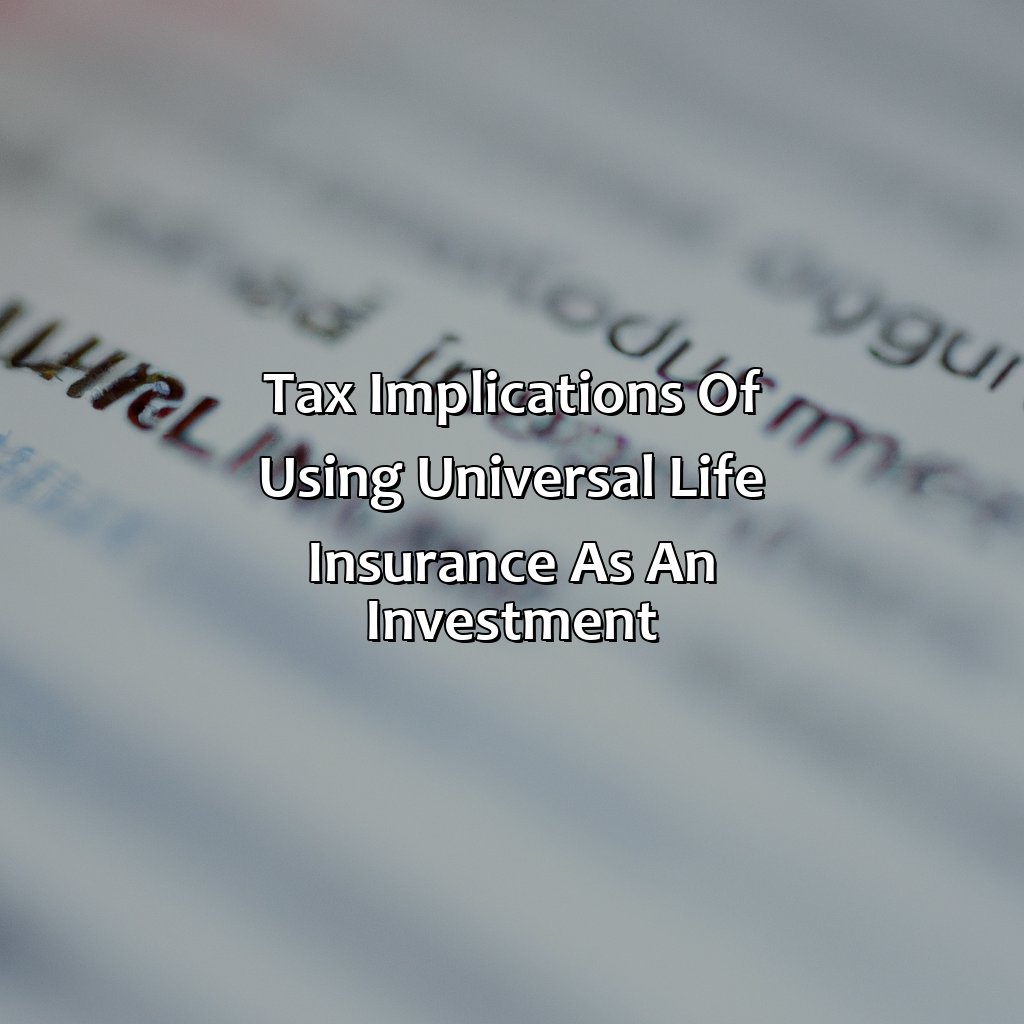
Image credits: retiregenz.com by James Woodhock
Tax Benefits
A Comprehensive Guide to Tax Savings with Universal Life Insurance Investment
Universal life insurance offers tax benefits as a long-term investment option. The policyholders can accumulate cash value that grows tax-deferred and borrow against it without incurring taxes on their gains. Premium payments are not tax-deductible, but death benefit proceeds are free of income and estate taxes.
By investing in universal life insurance, one can leverage the compounding of money without harmful taxation implications, thus maximizing the return on investment (ROI). Also, the account owner may gain access to tax-free cash flow for retirement or other purposes.
Moreover, universal life policies’ flexibility allows policyholders to adjust premiums and death benefit amounts based on their financial goals and changing situations effortlessly. Notice that an early termination may result in taxes or penalties under some circumstances; consult a professional advisor before making any decisions.
Pro Tip: Keep track of any changes you make to the policy if you claim it as tax-free income later because the mismanagement could lead to cancels deductions.
Why pay taxes when you can just invest in Universal Life Insurance and watch your money disappear into thin air?
Tax Considerations
Tax implications of utilizing Universal Life Insurance as an investment strategy need careful consideration. The proceeds can be tax-free if the policy is managed properly.
The account holder can accumulate cash value within the policy, and the funds would grow tax-deferred until withdrawn. Withdrawal may be tax-free only to the extent of basis (net premiums paid). Any excess withdrawal will be subject to ordinary income tax.
It is important to consider the contractual terms of a particular Universal Life Insurance policy because it usually has flexible premium payments, death benefits, and interest rates that affect your taxes in different ways.
Further understanding about cost basis, surrender charges, fees, or commissions associated with the scheme might have significant effects on your cash surrender value or death benefit while investing.
Think twice before withdrawing from your universal life insurance investment – the tax implications may leave you poorer than a college student surviving on instant noodles.
Taxation of Withdrawals and Transfers
Withdrawals and transfers from Universal Life Insurance policies are taxed in a unique manner. Interest earned on the policy is tax-deferred, allowing it to grow without being taxed. However, withdrawals or transfers of funds may cause partial taxation of the withdrawn amount and could also impact future tax-free growth.
When withdrawing funds, the initial amounts up to the cost basis are not taxable. Any remaining withdrawals will be considered interest income subject to taxes at ordinary income rates if the policy has a gain. You will need to calculate the cost basis by dividing total premiums paid for all years by the number of months/years from policy inception. Transfers may be subject to income taxation in certain circumstances such as transferring balances after changes to beneficiary designations.
It is important to note that there are different rules for loans taken from policies and their potential taxation implications compared to withdrawals or transfers. Loan proceeds are not considered taxable income unless they exceed adjusted basis and reduce cash value and death benefit received.
According to Forbes, some states have additional taxes on life insurance company reserves and capital investment income which can impact investments like Universal Life Insurance policies held inside an LLC or trust.
When it comes to estate planning and risk management, universal life insurance is the Swiss Army Knife of financial tools – versatile, reliable, and able to handle almost anything you throw at it.
Risk Management and Estate Planning Using Universal Life Insurance
Manage risk, plan your estate with universal life insurance! It’s a fantastic investment. Universal life insurance provides a great solution for:
- Wealth transfer
- Business succession planning
- Long-term care
Read the sub-sections to learn more about these topics.

Image credits: retiregenz.com by David Washington
Wealth Transfer
The transfer of assets and property to heirs or beneficiaries is a crucial part of estate planning. Universal life insurance can be used as an effective tool for wealth transfer, allowing policyholders to leave their loved ones with tax-free death benefits.
This type of insurance provides flexibility in premium payments and offers investment opportunities. Policyholders can accumulate cash value in the account over time, which can be accessed by the policyholder during their lifetime or passed on to beneficiaries.
Additionally, universal life insurance policies offer guaranteed death benefits, ensuring that loved ones receive financial support after the policyholder’s passing. The flexibility of these policies allows for customization based on individual needs and goals.
With proper planning and management, universal life insurance can help maximize the transfer of wealth between generations while minimizing taxes.
A successful example of this was the use of a universal life insurance policy by businessman Warren Buffett to transfer his wealth to his children while minimizing estate taxes. By placing shares of his company into the policy and designating his children as beneficiaries, he was able to provide for his family while minimizing tax burdens.
When it comes to business succession planning, it’s important to remember the golden rule: always have a plan B, because accidents happen and sometimes plan A goes up in flames.
Business Succession Planning
The strategic process of transitioning a business to new ownership or management is an essential component of long-term success. This involves developing a comprehensive plan that outlines the steps necessary to ensure a smooth transition of leadership and operations. It requires careful financial planning and risk management to ensure the continuity and sustainability of the business, which can be achieved through estate planning, insurance, investments, and other strategies.
Central to effective Business Succession Planning is identifying key stakeholders and outlining their roles in the transition process. This includes determining who will take over the leadership roles, how ownership will transfer, what procedures will be followed when transferring control, and how the new leaders will integrate into existing structures. Coordinating with legal counsel is also necessary to ensure compliance with regulations.
It’s crucial to have an understanding of your industry and market competition as well as a clear set of goals before making any significant decisions related to the future of a business. As such, it’s vital to develop contingency plans that mitigate risk factors such as economic downturns or unforeseen challenges.
A family-owned company founded in 1923 serves as an example of successful Business Succession Planning. The company successfully handed over leadership from one generation to the next by identifying future leaders early on and prioritizing succession planning through regular communication among family members, legal professionals, accountants, and financial advisors. As a result, the company has thrived for almost 100 years while remaining under family control.
Long-Term Care Planning
For maintaining long-term well-being, Universal Life Insurance can be utilized for medical and other long-term care planning. Its flexible structure allows you to use the insurance as an investment that can accumulate cash value over time.
With its tax-free growth, low-interest-rate policy loans, and tax-deferred compounding interest in retirement accounts, it can provide you with a secure source of income for the future. By selecting a rider that covers extended care expenses, you’ll have the necessary funds to cover daily living activities and protecting your family’s legacy.
Underwriting major medical conditions before becoming sick or injured can help make premiums affordable and offer peace of mind when long-term care needs arise. With the increasing cost of medical care and life expectancy, Universal Life Insurance is an excellent tool to employ in Long-Term Care Planning.
It is important to ensure that the coverage amount reflects the future costs of healthcare expenses in your desired location. You must work with an advisement focused on Long-Term Care Planning so that your insurance plan will provide sufficient protection when faced with significant health events.
To successfully implement Universal Life Insurance in long-term care planning, seek professional assistance from advisors qualified in Estate and Personal Financial Planning. They can assist you in formulating an effective strategy catered to your specific financial goals and circumstances.
Some Facts About How To Use Universal Life Insurance As An Investment:
Universal life insurance is a type of permanent life insurance that offers both a death benefit and a savings component. (Source: NerdWallet)
The savings component of universal life insurance is typically invested into a cash value account, which can accumulate tax-deferred interest over time. (Source: Investopedia)
Cash value in a universal life insurance policy can be accessed in the form of loans or withdrawals, but this may reduce the death benefit and may have tax implications. (Source: Policygenius)
Universal life insurance policies can offer flexible premiums and death benefit options, allowing for customization to fit individual needs. (Source: Forbes)
Using universal life insurance as an investment may not be the best option for everyone and requires careful consideration of individual financial goals and risk tolerance. (Source: The Balance)
FAQs about How To Use Universal Life Insurance As An Investment?
What is universal life insurance as an investment?
Universal life insurance is a type of permanent life insurance that offers both a death benefit and a savings component that can be used as an investment. This type of insurance accumulates cash value over time, which can be withdrawn or borrowed against for various investment purposes.
What are the benefits of using universal life insurance as an investment?
There are several benefits to using universal life insurance as an investment, including tax-deferred growth, flexibility in withdrawals, and the ability to borrow against the cash value of the policy. Additionally, the death benefit offers a layer of protection for your loved ones should anything happen to you.
What are the risks of using universal life insurance as an investment?
Like any investment, there are risks associated with using universal life insurance as an investment, including the potential for policy lapses or decreased returns due to changes in interest rates. Additionally, borrowing against the policy can decrease the death benefit or even cause the policy to lapse if the borrowed amount is not repaid.
How do I choose the right universal life insurance policy for investment purposes?
Choosing the right universal life insurance policy for investment purposes involves considering several factors, including your financial goals, risk tolerance, and investment strategy. It’s important to work with a financial advisor or insurance professional who can help you understand your options and make informed decisions.
Can I use universal life insurance as an investment alongside other investment vehicles?
Yes, universal life insurance can be used as part of a diversified investment portfolio alongside other investment vehicles. Incorporating a universal life insurance policy into your overall investment strategy can offer additional financial protection and tax benefits.
What is the process for accessing the cash value of a universal life insurance policy for investment purposes?
The process for accessing the cash value of a universal life insurance policy for investment purposes typically involves either withdrawing funds or borrowing against the policy. The exact process and potential tax implications will vary depending on the specific policy and the terms of the contract. It’s important to understand the terms of your policy and consult with a financial professional before making any decisions.
 Checkout this IRS Loophole
Checkout this IRS Loophole 
